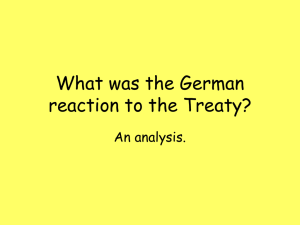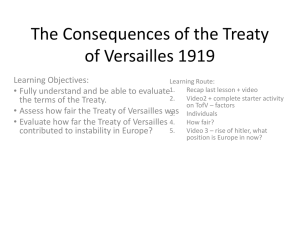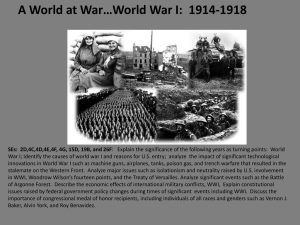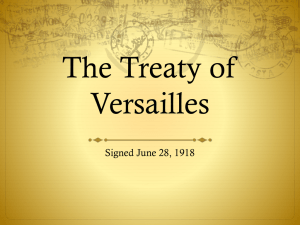6. German Reaction to the Treaty of Versailles
advertisement
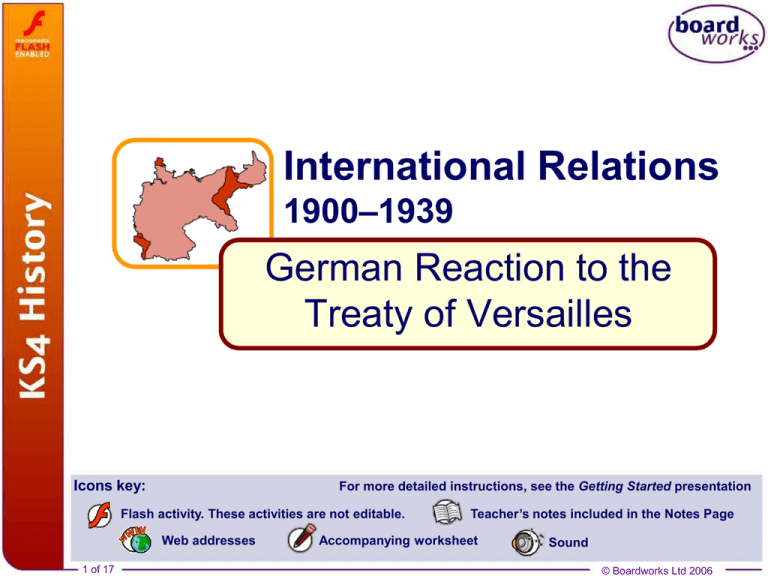
International Relations 1900–1939 German Reaction to the Treaty of Versailles Icons key: For more detailed instructions, see the Getting Started presentation Flash activity. These activities are not editable. Web addresses 11 of of 17 17 Teacher’s notes included in the Notes Page Accompanying worksheet Sound © Boardworks Ltd 2006 Learning objectives Learning objectives What we will learn in this presentation: The immediate German reaction to the Treaty of Versailles. The political problems that the treaty caused for the new German state. The economic impact of the treaty on Germany. The causes and consequences of the occupation of the Ruhr. 22 of of 17 17 © Boardworks Ltd 2006 The Treaty of Versailles 3 of 17 © Boardworks Ltd 2006 German reaction to the treaty Imagine you are a German in 1919. How would you have felt about your country signing the treaty of Versailles? Vengeance! German Nation How does this newspaper consider the peace settlement? 4 of 17 Today in the Hall of Mirrors, the disgraceful Treaty is being signed. Do not forget it. The German people will with increasing labour press forward to reconquer the place among nations to which it is entitled. Then will come vengeance for the shame of 1919. © Boardworks Ltd 2006 The effects of Versailles on Germany Germany lost more than just the war. The Treaty of Versailles resulted in Germany losing: 10% of its land 12.5% of its population The land lost was some of the most productive. Germany needed the revenue from these areas to rebuild the country and pay the £6.6 billion of reparations. Most Germans saw the restrictions placed on the German army as taking away Germany’s right to defend itself. On top of this, Germany would have to bear the blame for starting the war. Most Germans saw this as an attack on the honour of the German nation. 5 of 17 © Boardworks Ltd 2006 Germany after Versailles Many Germans were angered by what they saw as an unfair treaty. Philipp Scheidemann who was the German Chancellor in June 1919 resigned rather than sign “May the hand the treaty, saying, wither that signs Germans referred this treaty.” to the new Weimar government as the ‘November Criminals’ Scheidemann (as the armistice ending the First World proclaiming the War was signed in November 1918). new German In reality, the Weimar politicians had had Republic in 1918. no choice but to sign the treaty. 6 of 17 © Boardworks Ltd 2006 Protest and putsch In the years following the Treaty of Versailles, there were many protests and attempted revolutions (putsches) in Germany. In 1919, the Spartacists (a Communist group) attempted to overthrow the new German Government. They were defeated not by the government, but by a force of rightwing ex-soldiers called the Freikorps. In 1920, the Freikorps attempted a putsch of its own in Berlin, led by Dr. Kapp. It failed when the people of Berlin went on strike until the government was restored. In 1923, a right-wing nationalist group led by Adolf Hitler tried unsuccessfully to take over Bavaria. This group would later develop into the Nazi Party. 7 of 17 © Boardworks Ltd 2006 Protest and putsch Groups like the National Socialist German Workers Party (Nazis) rallied support by promising to overturn the terms of the treaty and return Germany to her proper place in Europe. German foreign policy became focused on the aims of regaining lost territory and wriggling out of complying with the other terms of the treaty. 8 of 17 © Boardworks Ltd 2006 Photograph courtesy of the Imperial War Museum, London. Groups opposed to the new democratic German government used popular resentment over the Treaty of Versailles to win support. Post-war economic problems 9 of 17 © Boardworks Ltd 2006 Inflation Political instability was increased by economic problems. The German economy had been weakened by the war. French demands for Germany to start to pay reparations immediately led to great financial strain. The result was that Germany suffered from inflation. Inflation is when the value of money decreases, so that people have to pay more and more for goods and services. 10 of 17 © Boardworks Ltd 2006 Inflation 11 of 17 © Boardworks Ltd 2006 Invasion of the Ruhr (1923) Germany managed to make its first reparations payment on time, but because of inflation, Germany could not pay the second instalment. The French were determined to enforce the treaty. French and Belgian troops occupied the industrial Ruhr region of Germany in order to take their reparations by force. The German workers in the Ruhr went on strike and refused to produce goods for the French to take. The workers became German heroes, but the strike only made the economic situation in Germany worse. 12 of 17 In our cafes we put up signs saying, ‘No Dogs or French allowed!’ © Boardworks Ltd 2006 Hyperinflation The invasion of the Ruhr caused mere inflation to escalate into hyperinflation. Prices in Germany rose so fast that people could barely keep up. Workers had to be paid twice a day and given half-hour breaks so that they could spend their wages before they became worthless. People had to carry their money around in wheelbarrows and laundry baskets. Shops had to resort to measuring notes by weight, as counting them took too Unemployment rose. long. People’s savings were completely wiped out. 13 of 17 © Boardworks Ltd 2006 Hyperinflation Two men sell paper money by weight. Their sign indicates that money is worth more than bones, but less than rags. 14 of 17 © Boardworks Ltd 2006 Occupation of the Ruhr (1923) As Germany neared economic collapse, the strike had to end. The German government agreed to let the French and Belgians take some coal as reparations. The Allies were persuaded that Germany needed more time to pay off the reparations. A new schedule was drawn up which spread the instalments over 59 years. Germany was also lent money by America to help her rebuild under the Dawes Plan. 15 of 17 © Boardworks Ltd 2006 Definitions 16 of 17 © Boardworks Ltd 2006 Exam question 1. Which were more serious for Germany – the economic consequences of Versailles, or the political consequences? [10] To answer this question you must first explain… The economic consequences: how reparations and lost territory, combined with an already weak economy, led to hyperinflation. How serious was this? The political consequences: the war guilt clause and harsh terms of the treaty damaged the new German government and led to revolts. Also caused resentment towards other countries. Come to a conclusion about which was more serious. 17 of 17 © Boardworks Ltd 2006

